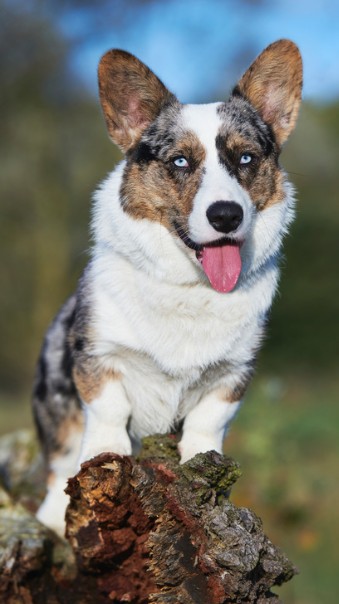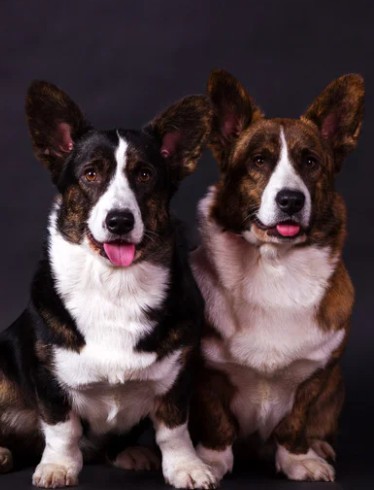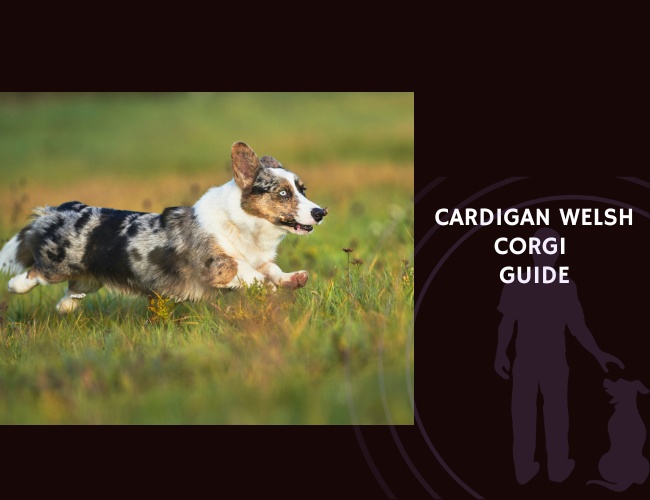Introduction to the Cardigan Welsh Corgi
A Glimpse Into the Past
The Cardigan Welsh Corgi is one of the oldest herding breeds in the world. Its roots stretch back over one thousand years, where their ancestors traveled with Celtic tribes into Wales. Cardigans were originally bred as herding dogs and farm companions, helping move cattle and guard property. Over generations, their intelligence and adaptable nature made them invaluable to Welsh farmers. Unlike some newer breeds, the Cardigan’s history is firmly tied to rural tradition and close partnership with people.
What Makes a Cardigan Unique?
Cardigan Welsh Corgis are known for their distinct look. They have long, low bodies with sturdy, strong bones. Their bushy tails (which look like fluffy fox tails) set them apart from the Pembroke Welsh Corgi, whose tail is typically short or docked. Cardigans’ ears are larger and more rounded, sitting wide apart on the head, giving them a wise and alert expression. Their coats are thick, water-resistant, and can be found in a variety of colors: everything from blue merle and brindle to red and black with tan or white markings.
Short legs and powerful bodies allow Cardigan Corgis to round up livestock close to the ground. This also means they need care to protect their backs from injury. Their form is not just for style—it’s perfect for herding! 😊
Popularity and Breed Recognition
While often confused with Pembroke Welsh Corgis, Cardigans are less common but cherished by enthusiasts for their loyalty and versatility. In recent years, both types of Corgis have gained recognition, especially as family pets. Major organizations like the American Kennel Club (AKC) and the United Kennel Club (UKC) now recognize the breed’s value in dog shows, agility, and as therapy dogs.
Their rising popularity owes much to their affectionate personalities, as well as their signature look—big ears, expressive eyes, and that unmistakable tail. From ancient farms to modern homes, the Cardigan Welsh Corgi continues to win hearts everywhere.
Next, we will explore what truly sets the Cardigan’s personality apart, focusing on their natural instincts and charm.
Character and Behavior
Herding Drive and Instincts
Cardigan Welsh Corgis have a powerful herding drive rooted in their history as working farm dogs. Their brains are wired to notice and control movement. When you see a Cardigan “herding” children or chasing squirrels, you’re watching instinct in action! These dogs use their keen vision and often fixate with steady eye contact—a technique that once helped them move cattle and sheep safely. This watchfulness is more than play; it brings together both motion sensitivity and a desire to guide those around them.
Temperament in Different Environments
Adaptability is one of the Cardigan’s strong suits. Whether at home, at the park, or meeting new people, most Cardigans show stability and resilience. Studies of their stress responses suggest they manage surprises better than many breeds, thanks to balanced hormones and a thoughtful nature. Loyalty runs strong—they attach to family members and can navigate social hierarchies at home. This means your dog may see themselves as a reliable helper, not just a pet. Cardigans display affection, especially with their chosen favorite humans, and tend not to become overly nervous during routine changes.
Alertness and Watchdog Traits
Cardigans have a natural tendency to be alert and observant in the household. Their sharp ears don’t miss much! While not aggressive, they may bark to warn you of visitors—and sometimes, that includes the mail carrier or a falling leaf. Their sensory abilities, both visual and auditory, allow Cardigans to act as gentle guardians. However, with proper training and reassurance, excessive barking can be limited to what’s truly important.
Cardigans use playful body language and a range of vocalizations to communicate with humans and other pets. Their emotional flexibility helps them bond, play, and even comfort family members when needed. A well-socialized Cardigan will surprise you with their insight and consistent, loving behavior 😊.
The next important aspect is understanding how these traits influence how a Cardigan Welsh Corgi learns and responds to training.
Training and Education
Understanding Preferred Learning Styles
Cardigan Welsh Corgis are clever dogs with a strong desire to work alongside their people. They love tasks that use their natural skills, such as herding or problem-solving. Research shows Cardigans typically do best with training that includes visual cues (like hand signals) and spatial tasks, but they are also quick to respond to clear verbal commands. If you notice your Cardigan picking up on gestures or changes in your body language, try mixing in signs with your spoken words for even better results 🐾.
These Corgis often thrive on routine and enjoy knowing what comes next. Short, regular training sessions help keep them focused without getting bored or frustrated. You’ll find they are happy to repeat tasks if rewarded frequently with treats, praise, or a favorite toy.
Effective Obedience Training Techniques
Consistency is the secret ingredient with Cardigans! As with many herding breeds, they respond best to positive reinforcement, which means rewarding the good stuff and gently redirecting unwanted behaviors. Here are some simple steps:
- Use short, clear commands (such as “sit,” “stay,” or “come”).
- Make lessons fun by switching up the rewards — sometimes a treat, other times a quick play session.
- Practice in different environments, like indoors, outside, or around new people, to help your Cardigan generalize commands.
- End training sessions on a success to keep your pup enthusiastic and confident.
Cardigans can remember commands well if taught in a playful, engaging way. If they seem distracted, try making the lesson more interesting or reducing distractions until your dog is more comfortable.

Balancing Impulse Control with Positive Reinforcement
Impulse control is a big part of a happy Cardigan’s life. Their keen nature and herding instincts might mean they act without thinking, especially if they spot moving objects or get excited during play. Training techniques focused on self-control, such as asking your dog to “wait” before dashing out the door or delaying treats, can work wonders.
Stay patient, use plenty of encouragement, and always end with something your Cardigan did well. With the right approach, your clever companion will succeed at new skills, making daily life more enjoyable for both of you 😊.
As you and your Corgi master the art of learning together, remember that meeting their other important needs will pave the way for lifelong health and happiness.
Nutritional Requirements
Managing Body Condition and Preventing Obesity
Keeping your Cardigan Welsh Corgi at a healthy body weight is essential for their overall well-being and longevity. These dogs have a natural tendency to gain extra weight, partly because of their low-set, sturdy build and big appetite. Over time, carrying too much weight can put added stress on their joints and spine, contributing to conditions like intervertebral disc disease (IVDD) and hip dysplasia.
To help prevent obesity:
- Measure meals carefully and avoid free-feeding. Consistent portion control is key.
- Select treats wisely—stick to healthy options and use them sparingly.
- Monitor their body condition using a hands-on approach—ribs should be easily felt but not visible.
- Keep track of your corgi’s weight with regular weigh-ins at home or during veterinary visits.
Diet for Joint and Spinal Health
Due to their long backs and short legs, Cardigan Welsh Corgis especially benefit from a diet crafted to support joint and spinal health. Look for dog foods that contain:
- Glucosamine and MSM: These help lubricate the joints and may slow degenerative changes.
- EPA and DHA: Omega-3 fatty acids support joint comfort and help manage inflammation.
- Moderate calories: Choose foods that support a healthy weight without being calorie-dense.
- The right balance of calcium and phosphorus: These minerals are important for bone strength, especially during puppyhood and into the senior years.
Supplements may be recommended by your veterinarian, particularly as your Corgi ages or if joint stiffness is noticed.
Age-Appropriate Nutrition
Your Cardigan Welsh Corgi’s nutritional needs will change as they grow:
- Puppies need food designed for growth. Look for formulas with the correct calcium, phosphorus, and high-quality protein.
- Adults thrive on well-balanced diets built to maintain weight and provide energy.
- Seniors benefit from foods lower in calories but rich in nutrients, antioxidants, and supplements that support heart, brain, and joint health.
Water should be available at all times to support healthy digestion and circulation.
Understanding and meeting your corgi’s unique nutritional needs ensures a vibrant, active life. As we continue, you’ll discover the essential steps for promoting lifelong health and well-being.
Wise. Loyal. Grounded.
Old Soul. The Cardigan Welsh Corgi carries a deep history in its short legs and wide-set eyes. Every step it takes echoes centuries of partnership, instinct, and quiet strength passed down through the hills of Wales.
Work and Wonder.
Though shaped for the field, the Cardigan’s talents go far beyond herding. Their minds are sharp, their hearts wide open, and their drive to engage makes them a joy to train. Give them a task, and they’ll give you their all—again and again.



Emotional Anchor.
These dogs don’t just adapt—they steady. Sensitive to energy shifts and devoted to their people, Cardigans become emotional mirrors in the home. They offer presence, protection, and a calm that feels like home itself.
Health Concerns and Management
Intervertebral Disc Disease (IVDD) Prevention and Management
The Cardigan Welsh Corgi is famous for its long body and short legs, but this unique build brings a higher risk of back problems, especially intervertebral disc disease (IVDD). IVDD happens when the discs between the bones in the spine become damaged. This can cause pain, weakness, or even paralysis.
Prevention is key!
- Keep your Corgi at a healthy weight to lessen pressure on their spine.
- Give your dog joint-friendly supplements like glucosamine, MSM, or fish oils, as recommended by your veterinarian.
- Avoid frequent jumping from high surfaces. Using ramps or stair guards helps prevent injury.
If your Corgi ever shows signs of pain, limping, or weakness in the back legs, prompt veterinary care is essential. Early action gives your buddy the best chance of recovery.
Common Genetic Conditions
Cardigan Welsh Corgis can inherit certain health issues. Hip dysplasia is a joint problem that makes walking painful and can cause arthritis over time. Regular gentle exercise, weight control, and joint supplements may all help give relief.
Progressive retinal atrophy (PRA) is another condition that Corgis may develop. PRA is an inherited eye disease that leads to vision loss. Ask your breeder for proof of genetic health testing, especially when choosing a puppy. Responsible breeders screen for PRA and hip dysplasia to help keep future litters healthy.
Other concerns include autoimmune conditions and hypothyroidism, so regular checkups are wise.
Regular Health Screening and Preventative Care
Setting up regular veterinary visits is the best way to keep your Corgi healthy.
- Schedule annual physical exams and keep up to date on vaccinations.
- Your veterinarian may suggest screening for IVDD, hip health, and inherited eye conditions.
- Maintain good dental health with routine cleanings.
Being proactive ensures any health problems are found early and makes managing your Corgi’s health much easier. With proper care and regular checkups, your Cardigan Welsh Corgi can lead a joyful and active life.
With these basics covered, you’ll see how much your care choices influence your companion’s daily well-being.

Exercise and Enrichment
Daily physical activity for optimal health
Cardigan Welsh Corgis are energetic and need daily exercise to stay happy and healthy. Their herding roots mean they love movement and thrive when kept active. A good routine is two brisk walks of 20-30min each day, mixed with playful time in a safe outdoor space. If you have a fenced yard, supervised fetch or agility games give your Cardigan a proper outlet for pent-up energy. Regular activity keeps their muscles strong and helps manage weight, which is important for their long backs and short legs. For those in apartments, creative indoor games or frequent short walks are fantastic 🐾.
Mental stimulation needs
Physical exercise is only half of the care equation. Cardigan Welsh Corgis are very smart and can get bored quickly if not mentally challenged. Without enough to do, they may bark a lot or find mischief. Interactive puzzle toys, nose work games, and hide-and-seek with treats keep their minds sharp and channel their problem-solving drive. Trying new activities like basic scentwork or teaching advanced tricks builds confidence and makes training feel like fun. Mental stimulation creates a calm, relaxed companion at home.
Modifying activities for age and health
Not all Cardigans need the same exercise plan. Puppies are playful and need short bursts of gentle play, with careful monitoring to protect their developing joints. Adult dogs can handle longer walks and more strenuous activities. Senior Corgis or those with joint problems do best with low-impact walks and gentle indoor games. Simple adjustments—like using ramps instead of stairs or playing softer fetch—help older dogs stay engaged while avoiding strain.
Every Cardigan is unique, so observing your dog’s stamina and tailoring activities ensures a lifetime of fun, fitness, and wagging tails.
As you support your Cardigan Welsh Corgi’s mind and body, their adaptable nature shines, helping foster a rewarding bond for years to come.
Living With a Cardigan Welsh Corgi
Adaptability to Urban and Rural Environments
Cardigan Welsh Corgis are impressively adaptable, making them wonderful companions for both city and country lifestyles. Their moderate size and moderate exercise needs mean they thrive in apartments as well as homes with large yards. While in urban settings, Cardigans benefit from regular walks and visits to parks to help satisfy their need to move and explore. These herding dogs may react to the many sights and sounds of the city with curiosity and alertness, so consistent enrichment such as puzzle toys and varied walking routes works wonders.
Rural life gives Cardigans more space to run, and they truly enjoy having safe, open areas to explore. However, their strong herding instincts can surface with livestock or even family members, so supervised play is key. Rural environments also mean these dogs can exercise their noses and instincts through scent games and adventures across fields or gardens.
Compatibility With Children, Seniors, and Other Pets
Cardigan Welsh Corgis are known for their gentle temperament and strong loyalty. Their stable nature makes them reliable family members across all age groups. With children, they are patient and engaging, encouraging gentle play while setting clear boundaries. Their sturdy build makes them resilient during play, but supervision is always recommended, especially with younger kids.
These dogs are empathetic and attentive with seniors, offering companionship and a manageable activity level. For multi-pet households, Cardigans adjust well—especially if they are socialized early. They communicate clearly with other dogs and even cats, reducing the chance of misunderstandings at home. Careful introductions keep things smooth, ensuring these loyal companions fit in wherever they go.
Climate Considerations and Seasonal Care
Cardigan Welsh Corgis’ thick, weather-resistant coats provide good insulation in cooler climates, letting them play in the rain or snow comfortably. However, in very warm weather, owners should be watchful. Limit exercise on hot days, provide plenty of water, and offer cool resting areas indoors. Shedding increases in spring and fall, so regular brushing is helpful to keep their coats healthy and your home tidy.
Thoughtful seasonal care and attention help Cardigans flourish as valued family members, ready to join in daily routines, activities, and cuddles.
Transitioning into focused care as these dogs grow older comes next, ensuring a happy and healthy life for every stage.
Senior Care and Special Considerations
Age-related changes in mobility and behavior
As Cardigan Welsh Corgis grow older, their bodies and minds start to experience certain changes. Mobility can be one of the first areas affected. Arthritis is common, leading to stiff joints and slower movement. You may notice your Corgi hesitates to jump onto furniture, struggles with stairs, or seems less eager for long walks. Sensory decline is also possible—hearing and vision might not be as sharp as before, and your dog could react more slowly or be startled more easily at home.
Behaviorally, older Cardigans can become more anxious or clingy. Sometimes, they sleep more during the day and become restless at night. Social shifts are also normal. An elderly dog might want more personal space or, in some cases, seek more comfort from family members. These changes are natural signs of aging and simply mean your Corgi needs a bit of extra care and understanding 😊.
Adjustments to care routines for aging Cardigans
Routine adjustments can make a huge difference in your senior Corgi’s comfort and well-being. Simple modifications like using non-slip rugs, adding ramps, or keeping frequently used items within easy reach help prevent slips and unnecessary strain on joints. Consider switching to shorter, more frequent walks rather than one long daily trek. Regular, gentle exercise keeps muscles toned and joints less stiff.
Diet is another important factor. Senior dogs often need fewer calories but may benefit from extra nutrients that support joint health, such as glucosamine and omega-3 fatty acids. Keep fresh water within easy reach, as older dogs can become dehydrated quickly.
Make your Corgi’s environment calm and predictable. Seniors often feel more relaxed with a set schedule for meals, walks, and rest time. Soft bedding and a draft-free sleeping spot add warmth and comfort.
Managing common senior health issues with veterinary support
Proactive veterinary care is crucial in the senior years. Schedule wellness exams at least every six months. Your veterinarian will monitor for signs of arthritis, kidney or heart problems, and may recommend routine blood work. They can also check for issues such as progressive retinal atrophy (PRA), which affects the eyes, and screen for cognitive decline.
Encourage regular dental checks, as tooth health plays a big part in your dog’s overall comfort and appetite. If you notice unusual symptoms—limping, confusion, changes in appetite, or new lumps—contact your vet promptly.
With thoughtful adjustments and regular support, your aging Cardigan Welsh Corgi can enjoy the golden years with comfort and joy.
Conclusion: Is a Cardigan Welsh Corgi Right for You?
Understanding the Commitment
Choosing to welcome a Cardigan Welsh Corgi into your home is a rewarding decision, but it comes with lifelong responsibilities. This breed thrives on daily interaction, both physical and mental. Cardigan Welsh Corgis need consistent exercise, regular vet checkups, and a nutritional plan designed for joint and spinal health. They excel when their environment is loving and predictable. Owners who succeed with Cardigans are those ready to commit to daily walks, training, mental enrichment, and gentle grooming.
Lifestyle Compatibility
Before bringing home a Cardigan Welsh Corgi, reflect on your lifestyle and living arrangements. These dogs do well in both apartments and large homes, provided they get enough attention and exercise. Their steady temperaments make them ideal companions for children, seniors, and even other pets. However, their strong herding drive may encourage them to “organize” household members or smaller animals. You’ll want to provide them with playtime and structure, which satisfies their natural instincts.
Cardigans are alert watchdogs, sounding the alarm at new noises, but generally not aggressive. They adapt well to different climates with their thick coats but appreciate protection during extreme heat or cold. Their unique personalities shine in families who involve them in day-to-day activities, regular play, and gentle leadership.
Resources and Support
For those interested in Cardigan Welsh Corgis, there is a supportive community of breeders, trainers, and veterinary professionals passionate about this special breed. Connecting with local breed clubs or rescue organizations helps you find reputable sources for adoption, training advice, and wellness programs. Educational materials like breed-specific guides and online forums share practical tips for health, behavior, and enrichment.
If you decide a Cardigan Welsh Corgi is for you, embrace the commitment with patience, energy, and love. With proper care, attention, and support, these loyal companions bring joy and devotion to any household 😊.










